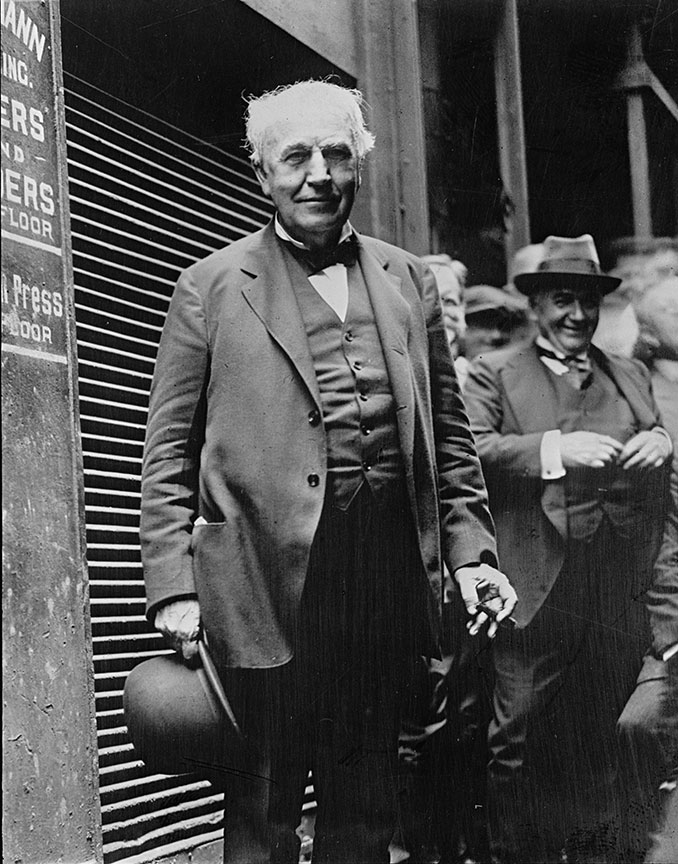
Ohio-born Edison is known for being the most prolific inventor in history. Though he started out inauspiciously enough as a telegraph operator, he soon invented an electric vote-recording machine. In short order followed the automatic repeater for ticker-tape and more than a thousand other inventions including the gramophone, the incandescent light bulb, and the kinetoscope. Edison established his laboratory for industrial research in New Jersey. .
Thomas Edison, one of the most prolific inventors in history, profoundly impacted the modern world with his numerous innovations. Born on February 11, 1847, in Milan, Ohio, Edison was the seventh and last child of Samuel and Nancy Edison. His early life was marked by curiosity and a desire to understand how things worked, traits that would define his career.
Edison’s formal education was brief, as he attended school for only a few months. His teachers considered him difficult, and his mother decided to teach him at home. This allowed young Edison to explore his interests at his own pace, fostering a love for reading and learning. By the age of 12, he had already set up a small laboratory in the basement of his family’s home.
Edison’s first foray into the world of work was as a telegraph operator, a job that introduced him to the emerging field of communication technology. His time as a telegrapher was crucial in developing his understanding of electrical systems and laid the groundwork for many of his future inventions.
One of Edison’s most famous inventions is the phonograph, developed in 1877. The phonograph was the first device capable of recording and reproducing sound, a breakthrough that amazed the world and earned Edison the nickname "The Wizard of Menlo Park." This invention was significant because it introduced the concept of recorded sound to the masses, paving the way for the music and entertainment industries as we know them today.
However, Edison’s most significant contribution is arguably the development of the practical incandescent light bulb. While he did not invent the light bulb itself, his work in 1879 made it affordable, reliable, and long-lasting. Edison’s light bulb became the cornerstone of modern electric lighting and led to the widespread use of electricity in homes and businesses. To support this innovation, Edison also developed the electrical power distribution system, establishing the first power station in New York City in 1882. This was the beginning of the modern electric utility industry.
Beyond the light bulb and phonograph, Edison held over 1,000 patents for various inventions, including the motion picture camera. His work in developing the kinetoscope in the late 19th century laid the foundation for the film industry. The kinetoscope allowed one person at a time to view moving pictures, and although it was eventually surpassed by other motion picture technologies, it was a crucial step in the development of cinema.
Edison’s success was not solely due to his inventive genius but also to his ability to commercialize his inventions. He was a savvy businessman who understood the importance of creating a market for his innovations. He founded several companies, including General Electric, which remains one of the largest and most successful companies in the world.
Despite his many successes, Edison also faced failures. For instance, his work on the electric chair and his promotion of direct current (DC) over alternating current (AC) in the so-called "War of Currents" were areas where he met significant opposition. However, these setbacks did not diminish his impact on the world.
Edison’s legacy extends beyond his inventions. He exemplified the spirit of innovation and perseverance, inspiring countless inventors and entrepreneurs. His belief in hard work and his famous quote, "Genius is one percent inspiration and ninety-nine percent perspiration," encapsulate his approach to life and invention.
Thomas Edison died on October 18, 1931, in West Orange, New Jersey, but his contributions continue to influence the world today. His inventions not only transformed industries but also changed how people live, work, and communicate, making him one of the most important figures in the history of technology and innovation.
 >
>